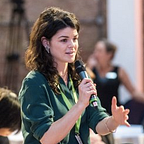You’re working on the wrong idea
If you have a technical background — maybe you’ve just finished your PhD, or you’re working in a startup — and you’re beginning to play with startup ideas, I’m going to go out on a limb and say, “you’re working on the wrong idea”.
The opportunity cost of starting a startup is pretty high — unless you build a really really big startup, you’re probably better off joining a big company, a bank or a really early stage, fast growth startup. This is why we’re fanatical about helping people work on ideas that will make the most of their unique skills, and in particular their technical skills. Why? Because this is how you maximise your chance of building a big startup.
You’re discounting your most valuable skills
Daily, we hear the same ideas (as most investors do). At the moment the popular ones seem to be online dating, finding house-mates and food delivery.
At EF, we work almost exclusively with technical founders, often pretty early on in their careers. What they all have in common is that they have a technical spike i.e., they have a technical area of expertise or skill that makes them stand out.
One of the things that fascinates me is how the ideas that our most technical founders come to us with are identical to the non-technical founders that we speak to.
To give you an example, we were excited to meet a hi-po (high potential EF applicant) because he had a very strong background in machine learning. He had multiple degrees in the area from top universities across Europe. He had published papers on cutting edge machine learning research. He had worked in startups on difficult machine learning problems. Can you guess what he wanted to work on as a startup? A travel app. He was bored of Machine Learning and wanted to try something new.
The work he had done over the last 8 years had given him a spike and an advantage compared to other founders, but only if he worked on an application of machine learning. He had discounted this, because he thought it would be easier to build a more ‘traditional’ startup.
You can’t see what’s hard
Why had he done this? One of the phenomenons we often see is that it’s really easy to see the problems and hurdles when you know a space well. This can be off putting as you can see how hard it’s going to be to build a startup. This also makes spaces outside of your experience and skills seem much more attractive — you don’t know the space intimately enough to know those problems and hurdles yet.
When you start a startup, everything is an unknown. You’re building an unknown product, for an unknown customer with an unknown business model. Your job as a founder is to turn those unknowns into ‘knowns’ as quickly as possible. You have an unfair advantage as you already know how your technical skills will make parts of the product possible. Yes, you know how hard it’s going to be, but that’s already an advantage compared to the founders who don’t have your level of skill, but who are working in the same space.
Building a startup is hard. Don’t make it harder for yourself. Embrace the challenges that you see. The fact you can see them means you already have an advantage.
You’re not thinking big enough
One of our favourite EF stories, and one which now really embarrasses the founders, is a story about two Imperial grads who tried to start a startup before joining EF — a home baked food delivery service. They spent four months building the product and trying to get traction, to no avail. They knew nothing about home baking and they knew nothing about delivery services.
Also while they were at uni, they had won the top prize for a recommendation algorithm that they developed. But, they hadn’t thought that could be used to build a startup. They joined EF and we helped them work out how they could use this recommendation algorithm to give them an unfair advantage. It worked and within three months they had 60 million people going through their product.
Your technical skills are an enabler for scale. If you’re not thinking about how to use them, then you should be thinking about the opportunity cost of not using them.
We can help you work out if it’s the wrong idea
At EF we work with the earliest of early stage companies, that is we typically work with technical individuals before they’ve formed a company. We help people to develop their ideas, to critique their ideas and to work out if this is the best idea for them to be working on.
Over the last 3 years, we’ve watched and helped more than 120 people to develop their early stage ideas. And the 20 companies in our portfolio are now valued at >$100m. You can read more about how we think about idea development at EF here.
We love talking to people about their ideas, so if you want to see if you’re working on the wrong idea, drop us a bell. www.joinef.com
